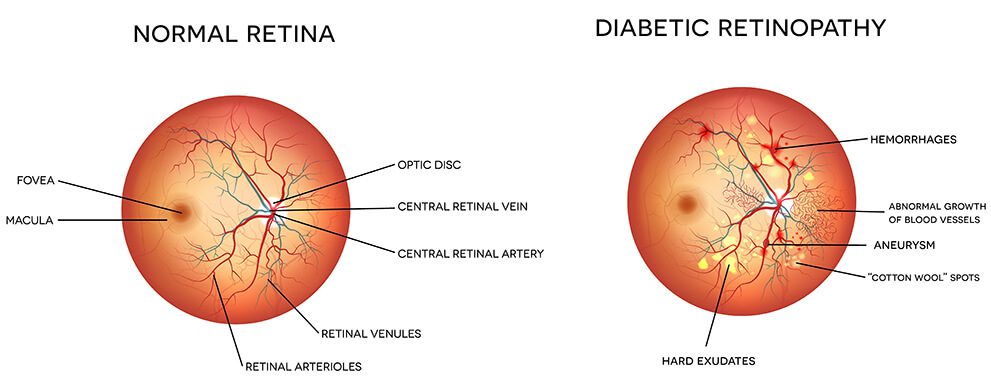Diabetic retinopathy is the most common diabetic eye disease. It consists of damage to the blood vessels in the retina and can cause vision impairment or blindness.

Risk Factors
All people with diabetes are at risk, including Type I (juvenile onset) and Type II diabetes. During pregnancy, diabetic retinopathy may also be a problem for women with diabetes. All pregnant women with diabetes should have dilated eye examinations each trimester to protect their vision.
About 50 percent of people with diabetes will develop diabetic retinopathy during their lifetime.
Prevalence
About 50 percent of people with diabetes will develop diabetic retinopathy during their lifetime. The longer a person has diabetes, the higher the risk to develop diabetic retinopathy.
Vitreous floaters are sometimes seen as threadlike strands in the patient’s visual field. Typically these lines/spots float or drift as the eye moves
Symptoms
Floaters can be a sign of diabetic retinopathy. Sometimes difficulty reading or doing close work can indicate that fluid is collecting in the macula, the most light-sensitive part of the retina.
Treatment
Two treatment options are available; both of which are very effective but do not cure diabetic retinopathy: Laser surgery is performed in a doctor’s office or eye clinic. Before the surgery, your ophthalmologist will dilate your pupil and apply drops to numb the eye. In some cases, the doctor also may numb the area behind the eye to prevent any discomfort. A vitrectomy will be performed whenever laser surgery is deemed inefficient, usually if you have a lot of blood in the vitreous. A vitrectomy involves removing the cloudy vitreous and replacing it with a salt solution. Because the vitreous is mostly composed of water, you won’t notice the difference between the salt solution and the normal vitreous.



Did you know glaucoma can often be treated at the same time as cataract surgery?
For qualifying patients, minimally invasive glaucoma procedures (MIGS) can help reduce eye pressure and medication use—while also restoring clearer vision.
One procedure. Two benefits. 👁️✨ ... See MoreSee Less
0 CommentsComment on Facebook
Retina care is one of our foundational services for our patients. Do not overlook these symptoms. Call us today if you are experiencing any of these so we can care for your vision. ... See MoreSee Less
0 CommentsComment on Facebook
If you are ready to start seeing clearly, call us today to schedule your exam at one of our many locations across the islands! ... See MoreSee Less
0 CommentsComment on Facebook
If your insurance benefits have refreshed for the new year, come on in to our optical shops to check out our frames unique only to the islands! Kona and Lihue! ... See MoreSee Less
0 CommentsComment on Facebook
It's Glaucoma Awareness Month! Glaucoma often develops without warning — and vision loss from glaucoma is permanent.
That’s why an annual glaucoma screening is essential, even if you aren’t experiencing vision changes. Early detection allows for timely treatment and helps protect your long-term eyesight.
If it’s been a year or more since your last screening, now is the perfect time to schedule.
📞 Call us today or book online to reserve your appointment and stay ahead of glaucoma.
Your vision is worth protecting. ... See MoreSee Less
0 CommentsComment on Facebook
Your annual eye exam can detect eye conditions before you even develop symptoms. If you are overdue, be sure to call your closest Island location today to make an appointment for the New Year! ... See MoreSee Less
0 CommentsComment on Facebook